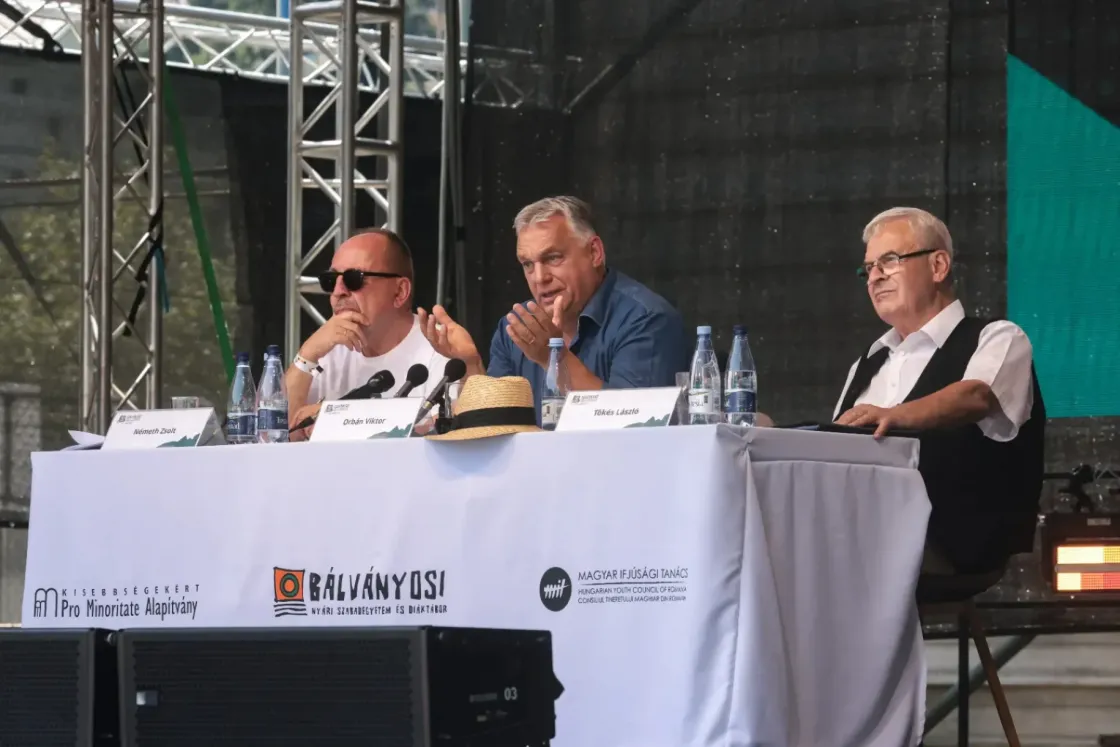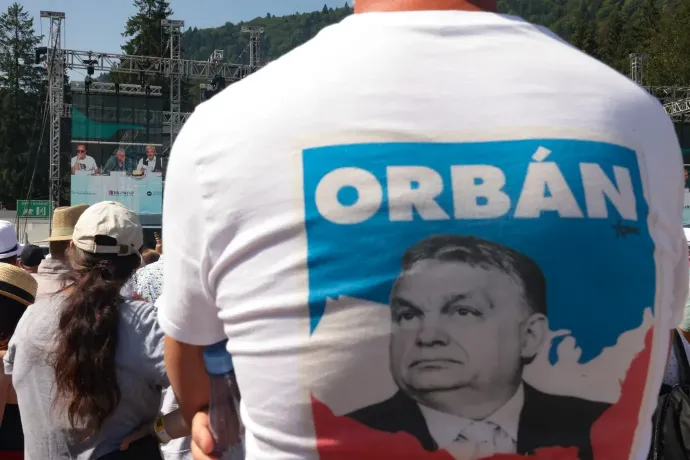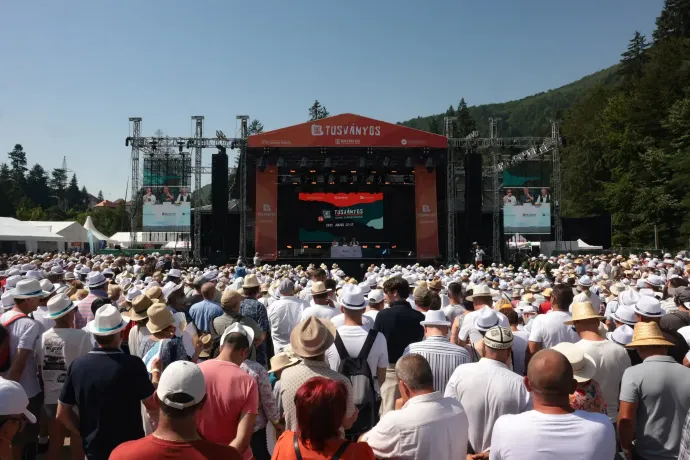
The Bálványos Free Summer University and Student Camp (more commonly known as Tusványos) has been organised in Baile Tusnad (or Bálványos) Transylvania since 1990. It has become a large-scale intellectual workshop of the Carpathian Basin, with tens of thousands in attendance. It was originally intended to promote cross-border cooperation, Romanian-Hungarian dialogue and a cultured political exchange between Hungarians with differing opinions. According to critics, in recent years it has become a place where members of the Budapest government and representatives of the intellectual establishment close to them express their ideas without substantive debate. It was here that Viktor Orbán first spoke about building an “illiberal democracy’ in 2014, and his speeches have become the highlight of the event and are largely considered to be marking the direction of Fidesz’ politics for the year ahead. This year’s speech, given on Saturday morning was no different.
Hungarian Prime Minister Viktor Orbán opened his speech by talking about the governing Fidesz-KDNP coalition's preparations for next year’s parliamentary elections, which are scheduled for April 2026. He said: "This is the last presentation of this kind in the current government cycle, and for next year, my plan is to give the opening presentation of the next government cycle here," he said.
When listing the items on his government’s agenda at this point, he said the first one definitely is the 2026 election. "There are never guarantees. Anyone who wants a guarantee for victory has got the wrong number. What the people decide is what’s going to happen. Today, eight months before the elections, I can tell you that according to our own internal polls, if the elections were held this Sunday, we would win 80 of the 106 individual constituencies, which would be a landslide victory and a clear majority. But I am not satisfied with this, and I ask that you not be either. Why would we settle for less in 2026 when we have won as much as 87 before?
He then went on to announce that to this end, they are launching the Digital Civic Circles, the first of which, he said, has already been founded.
The Prime Minister said that although this is significant in relation to the elections, its importance goes far beyond that. He believes that something must be done about the digital arena, which he says is dominated by trolling. It is for this reason that they must reorganize their community, in line with this new world: instead of trolling, they must create the culture of loving one's country, he said.
This is also important from the perspective of national sovereignty, according to the Prime Minister. "The leftists, the globalists, those who are pro-war are already romping around the digital space. We also need to conquer the digital realm."

Addressing the ethnic Hungarians living in Romania, Orbán said that the representative of the Hungarian opposition, which is controlled from Brussels, had already come to Oradea (a reference to Péter Magyar's recent visit to the city) and referred to Oradea as Romanian territory. "Those who have ears to hear know what this means," he said. In contrast, Orbán believes that "a state has borders, but the nation does not." He added that people can always count on the national government, that it will fight for them, but he also asked them to stand up for their future.
He pointed out that he had met with the Romanian Prime Minister on Wednesday and as he saw it, he had met with a heavyweight politician from Oradea, a Romanian patriot who will fight for Romanian national interests and who also wishes to see shared Romanian-Hungarian success and will work to achieve this. "There is a chance for good cooperation if Romania can overcome its current difficult economic situation," and Orbán believes that the Romanian prime minister has a good chance for that.
"Keep cool, remain composed, and maintain strategic calm" – how Hungary should approach today’s changing world order
What did Hungarians gain from Trump's victory? – Prime Minister Orbán asked, and he also answered his own question. He believes that political discrimination against Hungary is now a thing of the past, Paks II can be completed, and new investments are on the way. He said that "we don't have a definite answer to whether there would be a world war. Although with Trump back in office, the chances of this have been reduced, one can't know for sure.
"The winds that precede a storm are not always followed by an actual storm, but there are ominous clouds," the Prime Minister opined. One such ominous sign is that rivalry between the great powers always intensifies prior to world wars. Today, he sees three flags in the sky, as Russia returned to the picture and now stands next to China and the US in the wake of the Russian-Ukrainian war.
Another sign is that armed conflicts tend to intensify before every world war. Since 2010, the number of conflicts between states has doubled, Orbán said. Before every major war, the arms race also intensifies. Between 1990 and 2025, we have spent one and a half times more than we used to on weapons – this is by how much the turnover of the 100 largest arms manufacturers has increased, he said.
The Prime Minister believes that the world's countries forming into blocs is another warning sign, just as migration is. After citing some data, he concluded his thoughts on the subject by announcing that “The likelihood of a world war has been steadily increasing.”
What does this mean for the Hungarian people? Orbán posed the question, which he then also answered:
"Keep cool, remain composed, and maintain strategic calm," said the Prime Minister, who believes that Ukraine must not be brought into the EU, no matter how hard Brussels is trying.
In addition, he said that efforts must be made to achieve peace, which he believes he did when he met with Ukrainian president Zelensky last year. According to Orbán, it is necessary to "form a regional alliance of peace with those with whom it is possible," and he believes that Hungary is in a good position to do so. The Prime Minister said that we must prepare to stay out of the war because "one must know how to stay out of it," it is not enough to just talk about it.
According to Viktor Orbán, if we want to stay out of the war, there are five rules we must follow:
- "We shouldn't be at the mercy of others; we should have a good relationship with all the major powers in the world!" According to him, we are on good terms with the Americans, the Russians, the Chinese, the Indians, and the Turkic world, but we are not on good terms with Brussels.
- "We should have the strength to defend ourselves!" According to the Prime Minister, there is still much to be done in this area, but he listed a few achievements.
- "Developing the ability to withstand crises and self-sufficiency" – in the military industry, in the field of energy, the food industry and in digital capabilities – these are the most important areas in his view. The emergence of artificial intelligence has changed everything, and it has now become clear, according to Orbán, that this issue must be dealt with at the national level. He said that Hungary must join the race for artificial intelligence independently, with the goal of becoming a regional player.
- Human resources – in comparison with other EU countries, Hungary is spending the most on education as based on GDP.
- We must have a long-term plan spanning over generations and political cycles. According to Orbán, there needs to be national consensus on the fact that we must not isolate ourselves in any one bloc, but must be present in both Western and Eastern economies. The goal is balance in the global economy.
“Even good intentions can trigger war”
But will there be a European war? Orbán asked, adding that he believes this is already a reality. "It's not about whether there will be a European war, there already is one. The Russian-Ukrainian war is a European war." According to the Prime Minister, since 2014 (the Crimean war), Europe has been playing with fire, with hell.
."The very idea that Ukraine could belong to the West actually means the collapse of the balance of power between the West and Russia. This will always represent an existential crisis for those involved, and they will react accordingly." Orbán said that the West did not understand this and started a spiraling conflict by supporting Ukraine's desire to belong to the West. Thus, "even good intentions can trigger war if they appear in the wrong place." The idea of Ukraine's accession to the EU was brought up at the wrong time, which resulted in war, Orbán said.
According to the Hungarian Prime Minister, if there is no global order, there will only be regional survival zones, and the question then is what the European zone will look like 5-10 years from now.

The European Union has decided to go to war and to continue supporting Ukraine even if the US pulls out, Orbán continued. In contrast, Hungary has decided not to go to war and not to support Ukraine's accession to the EU. In his view, the European Union wants us to go to war and, it is to this end that they wish to see a pro-Ukrainian and pro-Brussels government in Hungary. "We, however, have decided that we will not allow either the Tisza or the DK to come to power, because we want Hungary to have a pro-peace, national government," he declared.
Hungary is not interested in the EU's wartime budget
According to Orbán, the EU's next budget is a wartime budget, with 20 percent of the money going to Ukraine. It is a budget designed to defeat Russia on Ukrainian territory, with the goal of bringing about Putin's downfall in Russia and a return to the liberal era of Yeltsin. He added that Hungary is not interested in a wartime budget and therefore won't accept the proposed draft.
Orbán, also spoke about the EU funds that have been withheld from Hungary. He said that half of the money has been already brought home and is "in our accounts," but the other half is also needed. "And we will get it," he said, because the new seven-year budget requires unanimity, but until Hungary receives its money, they will not approve the budget.
He then turned to Tisza's and DK's claim that they would bring the money home. According to the Prime Minister, this would indeed be the case because these parties had made a deal with Brussels: in exchange for the money, they would support the war, gender ideologies, and would abolish the utility price cuts. "So they would bring the money home in exchange for our sovereignty. I suggest that we be the ones to bring it home instead," he concluded.
Brussels’ federalist master plan
The European Union's current leadership will always be the last to conclude agreements with the United States, and these agreements will always be the worst, Viktor Orbán said. In his opinion, the trajectory of the path that the EU leadership has forced the European Union onto will lead to a trade war that we cannot win. This is why there needs to be a change of leadership in the European Union, he declared.
He also spoke about the deterioration of the relationship between the EU and China and how Brussels is seeking to fill the void left by the US in Ukraine, which makes it impossible to normalize the relationship with Russia. Brussels is gearing up for a cold war with China and the US and is already at war with Russia, he concluded.
According to the Hungarian Prime Minister, there is a federalist master plan in Brussels designed to take powers away from member states. He went on to say that the EU's budget can only be maintained through wartime economics and military loans. "Over the past ten years, we have allowed England to leave, and now we want to admit Ukraine. This is madness from an economic point of view, but there is a system behind it," he said, explaining that England is federalist and would have never agreed to a United States of Europe, whereas Ukraine would.
Hungary’s grand strategy revealed
So what is Hungary’s grand strategy? – Orbán asked, promising a short answer due to the heat.
The grand strategy is based on the fact that we were defeated in 1920 and our enemies decided that Hungary would be small and poor. The essence of the nation's strategy is to change this and make Hungary great and wealthy.
At this point Orbán recommended that translators use the word "great" instead of "big" (to translate the Hungarian word "nagy" – TN) citing Donald Trump's slogan "Make America Great Again" as an example.
The key questions of the grand strategy are as follows: where will we find enough people, where will we find the money, where will we find knowledge, how are we going to be able to defend ourselves, and how can we ensure that we are not excluded from major international decisions? According to Orbán, there will be no "importing people" here, just a family-friendly nation. He then went on to outline some of the economic decisions that have been recently made in order to achieve this.
Why does the future belong to Central Europe? Because of migration," the prime minister said, moving on to what he promised would be his last major subject. In his view, Western Europe was not able to defend itself against migration, and the alarm never went off in the heads of its leaders, which is why their old, familiar homeland no longer exists.
According to Orbán, the population of Western European cities has already been replaced, but Europe remains a destination for migrants, and there are now ready-made communities waiting to welcome them there. He claims that Europe will not be able to defend itself if "Africa" also sets out due to global warming.
He believes that in ten years' time, the most important task facing the Hungarian prime minister will be to protect the country's western borders from migration.
But why was Western Europe unable to defend itself? he asked. He believes that the answer is to be found in Christianity.
"If you lose Christianity, you lose your nation," Orbán declared, pointing to Hungary’s Fundamental Law, which he said recognizes the power of Christianity to sustain a nation. He said that the West failed to understand this, but was now beginning to grasp it, albeit too late.
According to the Hungarian Prime Minister, there are three stages in the relationship between Christianity and politics:
- When the world believed.
- When there is less and less living faith, but the framework of Christian culture is still present: what is sin, what is virtue, what is forgiveness, who is a man and who is a woman. "This is where Central Europe is today", he said.
- Zero Christianity – when Christianity is no longer a frame of reference and is pushed out of the countries' lives. The tipping point is when they legalize same-sex marriage. That is where the West is right now, he said.
Orbán concluded by noting that children must be taught that if they are Hungarian, they have a duty: to say no to what we do not need and to preserve what we have.
For more quick, accurate and impartial news from and about Hungary, subscribe to the Telex English newsletter!